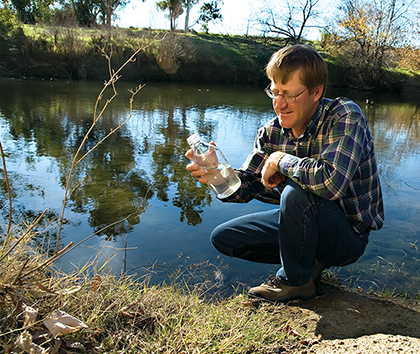
Rob Atwill’s research will help develop better farming practices for safer food.
Scientists tackle spectrum of food-safety concerns
When winter rains hit California’s central coast, Rob Atwill’s research team swings into high gear, pulling water samples from the streams, canals and ditches that link rangelands with vegetable fields. In a year marked with scares about the safety of foods ranging from spinach to pet food, the work of UC Davis researchers is increasingly vital.
“Our goal is to provide the data that growers need in order to develop farming practices that will safeguard their crops,” said Atwill, who is interim director of UC Davis’ Western Institute for Food Safety and Security.
A veterinary ecologist, Atwill studies waterborne diseases and how they might move through wild and domestic animal populations to affect human food and water supplies.
He and colleagues at UC Davis and the U.S. Department of Agriculture are intent on tracking the source of E. coli bacteria in the Salinas Valley and neighboring counties, where an outbreak of the devastating E. coli O157:H7 strain was detected last year in spinach.
The researchers also are sampling crops and the feces of livestock and wild animals, hoping to identify the source of the deadly bacteria and how it made its way into farmers’ fields.
In addition to the E. coli problem, UC Davis researchers from a variety of disciplines are tackling a broad spectrum of food-safety issues affecting milk, meat and fresh produce. The campus also is helping leaders from industry, government and academia come together to develop food-safety policies and practices that are workable in the very real world of commerce.
2007 FOOD SAFETY AND SECURITY

Study identifies deadly chemical duo in contaminated pet food
A pilot study, led by veterinary toxicologist Birgit Puschner and colleagues at the California Animal Health and Food Safety Laboratory in the School of Veterinary Medicine, found that two chemicals identified in this year’s recalled pet food scare are relatively harmless alone but, if combined, create a deadly mix when consumed by cats. Cats that were fed pet food spiked with both melamine and cyanuric acid quickly experienced acute kidney failure. Cats that received food containing only one or the other of those two chemicals experienced no ill effects. Results of the study are believed to be the first report on the chemicals’ combined effects in any animal species.
$4.65 million to fund new produce safety research center at UC Davis
A new $4.65 million Center for Produce Safety, to be located in UC Davis’ Western Institute for Food Safety and Security, will serve as a clearinghouse for research on produce safety and will fund new scientific studies aimed at reducing risks associated with the nation’s produce supply. It is the result of a new partnership between leaders of the produce industry, the California Department of Food and Agriculture and the University of California.
New drought-tolerant plants offer hope for warming world
Genetically engineered crop plants that survive droughts and can grow with 70 percent less irrigation water have been developed by an international team led by researchers at UC Davis. The discovery offers hope for global agriculture that is grappling with limited and variable water supplies. The University of California has filed a patent application on this technology.
